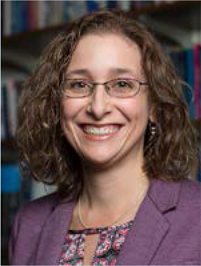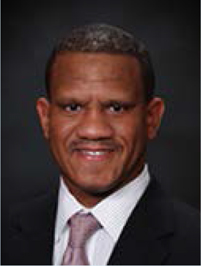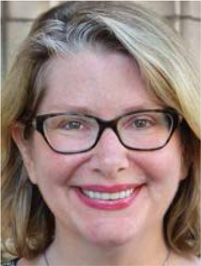Updates
Rosemary Banks, a senior adjunct fellow in the University of Canterbury’s Department of Political Science and International Relations, was named New Zealand’s Ambassador to the United States.
Stéphane Corcuff, a professor of political science at France’s Lyon University was honored with the French-Taiwanese Cultural Foundation Award.
Lara-Zuzan Golesorkhi, a visiting assistant political science professor at the University of Portland, was invited to the United Nation’s Global People’s Summit for her work with her nonprofit With or Without.
Bernard Grofman, Jack W. Peltason Endowed Chair at the University of California, Irvine, has been appointed by a federal court to redraw Virginia’s House of Delegates’ district lines to address racial gerrymandering.
David C. Hendrickson, professor of political science at Colorado College, has received the Gresham Riley Award for outstanding service, commitment, and accomplishment from alumni.
Devesh Kapur has been named the Starr Foundation professor of South Asian studies and director of Asia Programs at Johns Hopkins University School of Advanced International Studies.
Rep. Dave Loebsack, emeritus professor of political science at Cornell College, ran for a seventh term to represent Iowa’s 2nd Congressional District.
Taneisha Means, assistant professor of political science at Vassar College, was awarded The Class of 1951 Chair, given to Vassar’s most promising assistant professors.
James Meernik, regents professor of political science at the University of North Texas, recevied the Faculty Leadership Award for his impact through leadership and service.
Karthick Ramakrishnan has been recognized as part of the Frederick Douglass 200, celebrating those who embody the work and spirit of Douglass.
Ali Riaz, formerly a Distinguished Professor of Political Science at Illinois State University, was awarded the inaugural Thomas E. Eimermann Professorship for the years 2018–2020.
Glenn Sanders has been named the new dean of the College of Arts and Sciences at King University after serving as chair of the Department of Anthropology, History, and Political Science for years.
Vivien Schmidt, professor of international relations and political science at the Frederick S. Pardee School of Global Studies at Boston University, will receive the European Union Studies Association (EUSA) Lifetime Achievement Award.
Mark Scully, former assistant professor of political science at the University of the Ozarks, joins Lee University’s Department of History, Political Science and Humanities as an assistant professor of political science.
A report by Richard Sobel, consultant and speaker for the Houston Institute at Harvard University, “The High Cost of a ‘Free’ Photo Voter Identification Cards,” was used as a basis for questions in the Judiciary Committee Supreme Court nomination hearings for Brett Michael Kavanaugh in September.
Daniel Bennett Smith, previously a political science professor at the US Air Force Academy, has been named a career ambassador to the US State Department by the US Senate.
Andrew Westmoreland, president of Samford University, is among nine Alabama Humanities Fellows who were honored in The Alabama Colloquium at the Birmingham Museum of Art.
Gary Winslett joined the Middlebury College faculty as assistant professor of political science in the Department of Political Science.
Keep PS Informed
Share your news and announcements with PS and our readers. Let us know about your new appointment, activity, event, or award by emailing PS editorial associate Nick Townsend at ntownsend@apsanet.org.
Tracy Sulkin Named as University of Illinois Dean of College of Media
Tracy Sulkin was appointed dean of the College of Media at the University of Illinois at Urbana-Champaign and assumed the position in September 2018. Before her appointment, Sulkin, previously a professor of political science in the College of Liberal Arts and Sciences (LAS), was serving as the College of Media’s interim executive associate dean.

A member of the Illinois faculty since 2002, Sulkin is a Romano Professorial Scholar in LAS and was previously an LAS Centennial Scholar. Legislative Style, the third and most recent of her books on American politics, was published in 2018.
Sulkin brings extensive administrative experience to her new position. In the department of political science, she served as the director of graduate studies and associate head for undergraduate programs. She was elected to the LAS Executive Committee and served on the LAS Curriculum Committee. She also chaired the Undergraduate Education Task Force for the campus strategic planning process.
Yasmin Dawood Named a Member of the Royal Society of Canada
Yasmin Dawood, the Canada Research Chair in Democracy, Constitutionalism and, Electoral Law in the University of Toronto’s Faculty of Law, was one of six emerging scholars at the University of Toronto named as members of the Royal Society of Canada’s College of New Scholars, Artists, and Scientists in 2018.
The college, which was established in 2014, recognizes and fosters leadership and interdisciplinary collaboration among Canada’s new generation of scholars, artists, and scientists who received their PhD within the last 15 years. Membership extends for seven years.
Dawood, whose pioneering research and public engagement have influenced policy formation and public debate in the areas of election law, electoral integrity, and the protection of democracy, says the position in the college “is a tremendous honor” that will give her the opportunity to collaborate with a cross-section of scholars in the field. She would also like to contribute to the college, mentoring young scholars and participating in networks that address themes such as diversity, inclusion, and belonging. “As a woman, visible minority and religious minority, I know firsthand how important it is to have mentors in order to do one’s best work.”
Dawood became interested in election law as a political science undergraduate at the University of Toronto, studying constitutional law, political theory, and elections. She continued to look at the issues while doing a law degree at Columbia University in New York and a PhD at the University of Chicago’s department of political science. Her dissertation was on the US Supreme Court’s election law decisions. She spent two years in the University of Toronto’s Centre for Ethics as a Social Sciences and Humanities Research Council postdoctoral researcher, and in 2009 joined the Faculty of Law. She is now an associate professor who is cross-appointed to the department of political science.
Dawood’s research focuses on innovative legal solutions for safeguarding electoral fairness, strengthening democratic governance, and counteracting systemic obstacles like partisan bias. Her current research is a project that looks to see how courts adjudicate in conflicts that arise in election laws, comparing different countries to see how they have dealt with the issue.
Lawrence D. Bobo Appointed Harvard Dean of Social Sciences
Lawrence D. Bobo, W.E.B. Du Bois Professor of the Social Sciences, was appointed dean of social science at Harvard University by Claudine Gay, Edgerley Family Dean of the Faculty of Arts and Sciences.
Bobo, who chaired the department of African and African American Studies, took the helm on October 1, 2018.
A scholar of sociology and African and African American Studies (AAAS), Bobo has illuminated issues of inequality, politics, and race in his research. He was hired in 1997 to a joint position in sociology and the former Afro-American Studies Department. In 2016, Bobo helped Gay, then dean of social science, found the FAS Inequality in America initiative, a multidisciplinary effort to elevate teaching and research in this critical area.
Upon learning of the appointment, Bobo said he was thrilled “for the opportunity to deepen ties across the departments and to help colleagues continue to pursue and conduct excellent research and engage in the innovative teaching that has characterized this faculty.”
Bobo’s most recent book, Prejudice in Politics: Group Position, Public Opinion, and the Wisconsin Treaty Rights Dispute, was a finalist for the 2007 C. Wright Mills Award. He is coauthor of the award-winning Racial Attitudes in America: Trends and Interpretations, and founding editor of the Du Bois Review: Social Science Research on Race, published by Cambridge University Press.
Bobo is a member of the National Academy of Science and a fellow of both the American Academy of Arts and Sciences and the American Association for the Advancement of Science. He has held tenured appointments in the sociology departments at the University of California, Los Angeles, and Stanford University, where he was director of the Center for Comparative Studies in Race and Ethnicity.
Alvin Tillery Jr.’s Speaks at Kenyon College
Alvin B. Tillery, Jr., associate professor in the Department of Political Science at Northwestern University, presented a lecture titled “Performance vs. Power: Is the Black Lives Matter Movement Winning?” at Kenyon College in September 2018, sponsored by Kenyon’s African Diaspora Studies Program, the Law and Society Program, the Department of Political Science, the Public Policy Program, and the Faculty Lectureships Program.

Tillery’s academic interests include American politics and political theory, with particular focus on media and politics, racial, and ethnic politics, and critical race theory. He also presented “Tocqueville, Critical Race Theory, and the Future of Multiracial America,” a lecture on the 19th-century French political theorist Alexis de Tocqueville while visiting the college.
Tillery’s book Between Homeland and Motherland: Africa, US Foreign Policy and Black Leadership in America earned the W.E.B. Du Bois Distinguished Book Award from the National Conference of Black Political Scientists. His papers have appeared in Studies in American Political Development, Journal of Black Studies, and Political Research Quarterly. His forthcoming book will examine African American attitudes toward immigration between 1850 and 1965. Tillery earned his bachelor’s degree in political science from Morehouse College and a doctorate in political science from Harvard University. In addition to his appointment in Northwestern’s political science department, Tillery works as director of Northwestern’s Center for the Study of Diversity and Democracy.
Dan Slater Speaks at the Weiser Center for Emerging Democracies
The Weiser Center for Emerging Democracies (WCED) at the University of Michigan presented an inaugural lecture by Dan Slater, Ronald and Eileen Weiser Professor of Emerging Democracies and professor of political science on the topic “Democracies Emerging and Submerging” in September 2018. In the lecture, Slater explored how research on authoritarianism and democratic dysfunctions might ironically shed light on enduring questions of democratic emergence—especially when it builds on concepts transcending disciplinary boundaries. The lecture served as a keynote for the “Democracies Emerging and Submerging” conference hosted by WCED on September 28–29, 2018. The conference, a meeting of the Democratic Change Research Initiative, brought leading scholars of authoritarianism and democratization to WCED to present and discuss their ongoing research on why democracy and autocracy either emerge and endure or falter and fail.
Slater specializes in the politics and history of enduring dictatorships and emerging democracies, with a regional focus on Southeast Asia. He came to the University of Michigan after 12 years on the faculty at the University of Chicago, where he served as director of the Center for International Social Science Research (CISSR), associate professor in the Department of Political Science, and associate member in the Department of Sociology. His book manuscript examining how divergent historical patterns of contentious politics have shaped variation in state power and authoritarian durability in seven Southeast Asian countries, entitled Ordering Power: Contentious Politics and Authoritarian Leviathans in Southeast Asia, was published in the Cambridge Studies in Comparative Politics series in 2010.
Laura Olson Elected President of SSSR
Laura Olson, J. Strom Thurmond Professor of Political Science at Clemson University, has been elected president of the Society for the Scientific Study of Religion (SSSR). The society is the leading scholarly organization for social scientists who study religion. It sponsors an annual conference each fall and publishes the Journal for the Scientific Study of Religion, which Olson edited for five years.

“The presidency of SSSR is an elected office, so it is an especially meaningful honor to be recognized by my peers in this way,” Olson said. “Moreover, the roster of past presidents includes generations of the leading scholars in my area of expertise. It is very humbling to have my name included alongside theirs.”
Olson’s research focuses on contemporary religion, civic engagement, and American politics. She is the author or editor of eight books. Her work also has appeared in leading scholarly journals, including Political Research Quarterly, Social Science Quarterly, and the Journal for the Scientific Study of Religion. She also has served on the board of directors of the Public Religion Research Institute in Washington, DC, as well as on the American Academy of Religion’s Committee for the Public Understanding of Religion.
Her term as president will last from fall 2019 to fall 2020. In her role, she will give a public address at the annual meeting in 2020, as well as a few administrative duties, such as running the society’s committee that awards small research grants.


